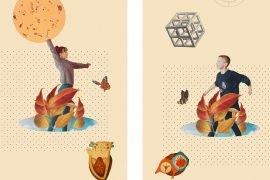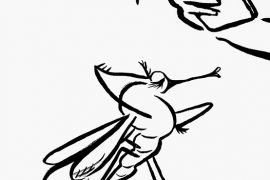[dropcap letter=”I”]
n some aspects they were like night and day, like their husbands. One wanted to accompany her husband, Lluís Companys, everywhere and to be recognized. The other stayed at home, and people thought that Josep Tarradellas was single. Carme Ballester was a politicized woman, who wanted to give her opinion and be heard. Antònia Macià was reserved, and although she had her political ideas, she was careful not to explain them, as her husband asked her not to do so, being contrary to the fact that the ladies got involved in the affairs of government and party.
In other aspects, they were women with parallel lives. Both were sewing at different times to survive and also experienced the disapproving looks of the ladies of the Barcelona bourgeoisie being as they were, despite their worker origin, wives of two of the most prominent politicians in Catalonia in the 1930s. Above all, however, Ballester and Macià accompanied Companys and Tarradellas in their devotion to their children.
In the case of the first, the tragic search for Lluïset, in the context of the Nazi occupation of France, led to his arrest and subsequent execution. Carme Ballester, once she located him, took care of him the rest of her life, even if she was not her biological mother. In the case of the second, Montserrat’s Down syndrome was always taken into consideration in a human, natural way, with the support of Antònia Macià, who took good care of her first daughter.
The approximately fifty people that met in the Francesca Bonnemaison space in Barcelona on October 17th were able to follow the life journey of two women with a capital biography, regardless of the transcendent journey of their partners. They did it thanks to the explanations of two good connoisseurs, the historian Oriol Dueñas, author of the recent and interesting biography Carme Ballester: compromís, resistència i solitud (Gregal, 2018) and Montserrat Catalán, until a couple of years ago, director of the Archive Montserrat Tarradellas i Macià, former secretary of President Tarradellas and person of the strictest confidence for Antònia Macià.
The confrontation of these biographies is an initiative to reunite lives of women that deserve to be highlighted, fruit of the collaboration of the Institut Català de les Dones, the Josep Termes chair and the support of the Diputació de Barcelona, benefiting from the sponsorship of the Doblemente invisibles (“Two times invisibles”) cycle.
Dueñas, in a speech accompanied by barely known images of Ballester, wanted to highlight her strong personality, “the influence on Companys and the happiness she lived as a result of the relationship with him and his marriage, even if it was celebrated once the Civil War had already started”. After the war, in exile, it was Tarradellas who helped her overcome the hardships and loneliness of the person who had served as first lady, even if the role was not institutionalized.
“When she visited Tarradellas in Saint Martin le Beau”, he recalled in his magnificent and detailed Catalan speech, “Carmencita always wanted to drink Evian”. This was arranged, whenever possible, by Antònia, who for years had taken over as the wife of the president of the Generalitat in exile, a woman who “above all always knew her place”.
The confrontation of these biographies is an initiative to reunite lives of women that deserve to be highlighted, fruit of the collaboration of the Institut Català de les Dones, the Josep Termes chair and the support of the Diputació de Barcelona, benefiting from the sponsorship of the Doblemente invisibles (“Two times invisibles”) cycle due to their female condition and the lack of recognition in the official -or best known- historical account. The cycle has already focused on the lives of Teresa Mañé, Carme Serrallonga, Carme Karr, Pepita Casanellas and María Lorenza Longo. If, when reading these names, the reader has not known that they belong to a pedagogue, editor and anarchist, a pedagogue and translator, a writer and musicologist, a pedagogue and a reformist religious… That may work as a proof of the need to attend the rest of the conferences of the cycle.
On November 6th, in the same space, the journalist Genís Sinca and the writer Betsabé García will confront the trajectories of two sportswomen, the athlete Ana María Martínez Sagi and the aviator María Pepa Colomer. On November 14th the doctor Carlos Hervás and the historian Antonieta Jarne will present the lives of two scientist women, the anaesthesiologist María Oliveras and the doctor and politician Aurelia Pijoan. On the 28th of November, the exciting biographies of the journalist Irene Polo and the pianist Maria Canals, narrated by the communication professor, Elvira Altés and the journalist Ana María Dávila.




















